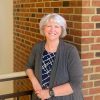Last week, five of us attended “At This Place: History: Race and a Way Forward, Universities Studying Slavery Spring Conference” at UNC Chapel Hill. See the blog posts below.
Tanya Zanish-Belcher:
I always learn something new whenever I attend the Universities Studying Slavery conference and would highly recommend it to anyone interested in the continual impact of slavery on our country, our institutions, and each of us as Americans. The session which truly impacted me the most was listening to presentations and papers from James Madison University, Roanoke College, and Washington and Lee University. Each of the speakers presented on issues and challenges on their respective campuses as they explored the impact of slavery as an institution, the confrontation of uncomfortable histories, and renaming buildings named for Confederates and enslavers. Two of the speakers were undergraduate students, but the content of their papers was excellent–Ivey Kline from Roanoke College received sustained applause. The questions to the panelists ran far beyond our allotted time.
A descendent audience member from Montpelier asked about the most recent debacle as JMU has worked closely with Montpelier. Here is more information about what happened and I should note the Winston-Salem connection–Montpelier’s Executive Director is Elizabeth Chew, who was the Betsy Main Babcock Director of the Curatorial and Education Division at Reynolda House, 2013-2015. Montpelier has developed an important matrix for working with descendants of the enslaved.
Tim Pyatt:
I was only able to attend the Thursday sessions but found all of the presentations I attended to be very good and thought provoking.
The opening plenary was introduced by UNC Chancellor Kevin Guskiewicz. The co-chairs of the University Commission on History, Race, and A Way Forward, Jim Leloudis and Patricia Parker, gave an overview of the work of their commission. While informative, the Q&A session was probably the most interesting part of the presentation. A number of UNC faculty, students, and alumni were in the audience and many questions centered around how to get the UNC Board of Governors to support the recommendations of the Commission. Chancellor emeritus James Moeser was in attendance and gave a comment that Chancellor Guskiewicz needs the vocal support and advocacy of faculty, student, and alumni to help him make sure these recommendations are approved.
Next I attended a session on how the four schools supported by The Duke Endowment are working together to reckon with their racial histories. The schools are Duke, Furman, Davidson, and Johnson C. Smith. I was especially interested in the work of Johnson C. Smith (a HBCU) and their work to document segregation, redlining, and the destruction of historically Black communities through so-called “urban renewal” projects. One example is their digital collection documenting the West End neighborhood of Charlotte.
Probably the most thought-provoking session I attended was one led by three descendants of individuals enslaved by the Jesuits at St. Louis University. They have created their own organization, Descendants of St. Louis University, and lamented that too often universities do not look to engage descendants in a manner that is mutually beneficial. In the worst case scenario they are looked on as “free labor” to help the university reconcile and rehabilitate its past. They also cited the Montpelier rubric for engaging with descendants as past practice.
Finally I attended a session about UNC’s participation in On These Grounds: Slavery and the University. Chaitra Powell, Director of the Southern Historical Collection, talked about this collaborative effort to build a digital framework to bring together collections documenting slavery. Originally started by Virginia, Georgetown, and Michigan State, libraries at UNC, Hampton-Sydney, Georgia, Washington & Lee, and Rutgers have joined on as testing partners.
Ashelee Gerald Hill:
This was my first time attending USS. Although I only attended one day of sessions, it was a very enriching experience. The participating institutions ranged in size from small colleges to larger universities and represented their respective institutions’ historical relationship with slavery and racism in a variety of ways. The conference reminded me of how working, or aspiring to work, in academia affords some professionals an optimistic perspective of “higher education”, however, systemic oppression and racism are pervasive and transcendent and I couldn’t help but juxtapose the boon that slavery was for a lot of institutions against underfunded and under-resourced HBCUs – institutions that have been integral in the education of former slaves and their descendants for longer than white institutions have even been admitting Black students. Especially as it relates to accessing resources and having the ability to do memory and reparative work in the present-day.
I was interested in the information gathering methods and documentation used for projects – account books, oral histories, and a lot of spreadsheet entries – that helped lend more context and information to the lives of the Black workers and laborers who were so vital to the formation of these collegiate communities. One of the more poignant projects is one in development at Johnson C. Smith University where they are using virtual and augmented reality tech to recreate Black communities in Charlotte that have been destroyed by gentrification. I hope they receive funding to continue the work and do justice by those who experienced life in those communities and are still living today. Presenters also commented on the difficulties in finding historical documentation which resonated with me as I struggle with this in my own work. Finding information from those whose voices and experiences are forgotten or not considered is a laborious task and we are often left using resources created by (and from the perspective of) their oppressors. As I move forward in my professional career, I hope to use my experience at USS and new perspectives in my archival work documenting a whole-picture legacy of Wake Forest to the benefit of its students and the surrounding community.
Stephanie Bennett:
I’ve appreciated attending USS two years in a row, with last year’s spring conference in Greensboro and Winston and this year’s in Chapel Hill. The conference is an interesting confluence of historians, archivists, other cultural heritage practitioners, descendants of the enslaved – it’s meaningful and instructive to hear these views in dialogue and contradiction in real time.
I attended the same sessions that Tim did. I was listening for mentions of archival research and work, and there were many, both slight references and long-form discussions. I believe that only the archivists acknowledged archival silences; there are some truths and some lives that will never be found documented in records kept by institutions, and maybe not anywhere else. In addition to not being kept, records can be silenced in many ways. Sometimes records are silenced by archival labor done by people centering only the profitable and/or powerful; sometimes by the lack of archival labor when materials remain unprocessed in an institution, or not known about in an attic or basement until someone passes away. It’s sobering to think about how important clear, accurate, honest, and minute descriptions can be to the use of archival materials that are held by colleges and universities.
Last year, there were some discussions that included members of the descendants communities but this year, I appreciated the opportunity to attend the session led by the Descendants of the SLU Enslaved (DSLUE). Three members of DSLUE leadership-Robin Proudie, Billie Wilkerson, and Claire McFarland-talked about their work and their interactions with SLU administration. Members of several other descendants groups shared their experiences from the audience, and administrators as well.
I also want to say a little about Chaitra’s discussion, specifically pointing to the values of radical empathy that the On These Grounds (OTG) team developed and used as they did difficult work with collection items that document the trade and the individual lives of enslaved men, women, and children. Radical empathy was included in the OTG training that every school’s workers received, but UNC shared how they used that as a starting point to discuss the concept more deeply in a small group. This blog post captures the six values that the team created together and readings that helped inform them.
Rebecca May:
I was unable to attend USS last year, but found this year to be fascinating and invigorating. A session that has not been discussed that I found fascinating was “Psychiatry and the Legacy of Slavery: The Asylum and the Archive Initiative” presented by Robert Allen, Philip Feibusch, Nate Nihart, Leah Tams, and Abby Wooten of UNC Chapel Hill, and Sarah Almond of Hampden-Sydney College. This panel worked together on medical records for NC psychiatric hospitals, specifically Dorothea Dix Hospital and later Cherry Hospital. Specifically focusing on the very short time period that Dorothea Dix hospital treated black patients and later when Cherry Hill hospital was opened to treat black patients, the panelists discussed their work with the records of the hospitals. Each panelist had a unique interaction with the records. Their collective work included transcription, data visualization, research, case studies, and implications of past psychiatric work to the current practice. The panel included current undergraduate students, archivists, an emeritus professor of American Studies, and a psychiatry resident. It was truly fascinating to hear how one set of records provided so much content for their very specific work, interests, and research.
As an example, one panelist discovered that the reason a black male patient was seeking psychiatric treatment was due to “emancipation” post Civil War. She went on to research this man’s life prior to and following emancipation from slavery, illustrating a life that did not benefit from emancipation as fully as one might hope. The systems in place for a newly emancipated man did not prove favorable for this man, resulting in being admitted to the psychiatric hospital. The speaker did extensive research on him and found him in later census records seemingly in better circumstances than during his post war hospitalization. I am doing this panel very little justice with my description, but I assure you it was engrossing!



5 Comments on ‘ZSR at the Universities Studying Slavery Conference, Chapel Hill’
Thank you all for this expansive and fascinating post. I’m gratified to see that the conference is continuing to uncover hidden and tragic histories of institutions and our troubling past.
History does matter !
Thank you all for this engaging discussion of your experience at the USS conference. I have seen compelling presentations with the staff of Monticello. Some, who are Hemings family descendants, spoke about the importance of having this discussion.
Thank you for sharing about all of the work being done!
Thank you, all, for this insightful summary. Much work remains to be done, but it is encouraging to know that so many institutions are already engaging. Stephanie, I was particularly struck by your comment about archival silencing due to lack of labor. I’ve never thought of it that way, although I realize it is true. I appreciate that new insight.